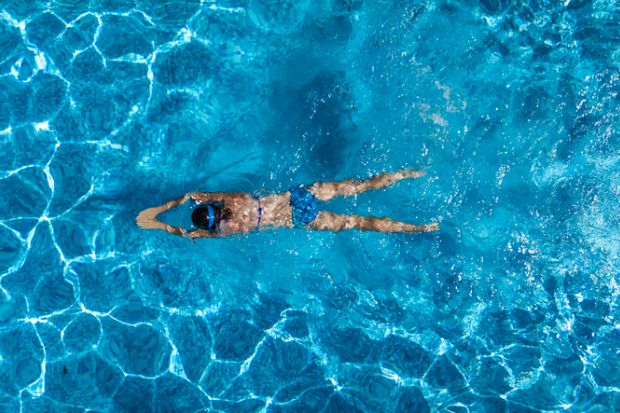Could a swimming club help generate a form of “academic activism”?
That is the question explored by David Raymond Jones, a professor in Northumbria University’s Faculty of Business and Law, in a new paper in the British Educational Research Journal.
In 2009, he writes, he was looking for ways to “gain a respite from the increasing managerialist practices in my university”. He therefore decided to set up a “slow swimming club”, which now includes 20 academics from three local universities.
The club certainly provided a social outlet and a way to switch off from endless meetings and other stresses of the day job. But could it also function as a form of resistance?
To answer that question, Professor Jones turned his respite from work back into a different form of work and used it as the basis for an autoethnographic research project involving 11 of the academics.
One respondent noted simply that swimming had become crucial “as a break for me to just relax and think rather than to be the zombie I tend to turn into, if I am not careful”. Yet many felt that it had also made a deeper – and more political – impact on the way they “crafted their work back in their respective universities”.
One of them “began to realise that I could actually do something about my frustration with long, tedious and…meaningless meetings about justifying some initiative around a flavour-of-the-month accreditation”. Others “felt so much more freedom to initiate projects myself” or now seemed able to “take a deep breath and cut through the rubbish”.
Even more striking was the swimmer who used to view people in “quite instrumental and self-interested” ways but had now started to “work with people much more willingly and openly”. Professor Jones himself claims that previously he “would never have taken on the role of head of department, which I did in 2018, as I would have seen the role as too compromising. The experience of slow swimming encouraged me to view such an opportunity as a form of academic activism,” leading to collective efforts to “change senior management agendas”.
What might sound like an innocuous leisure initiative, Professor Jones’ paper therefore argues, offered “a possible pathway to creative resistance, which...embraces alternative ways to conduct academic work, in parallel with managerialist practices. Through the collective embrace of these alternatives, such managerialist practices could gradually be contested.” Whoever knew that a swimming club could have such political potential?
Register to continue
Why register?
- Registration is free and only takes a moment
- Once registered, you can read 3 articles a month
- Sign up for our newsletter
Subscribe
Or subscribe for unlimited access to:
- Unlimited access to news, views, insights & reviews
- Digital editions
- Digital access to THE’s university and college rankings analysis
Already registered or a current subscriber? Login








